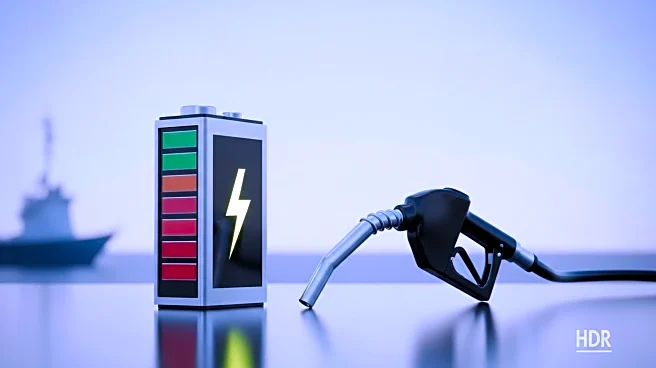What is the story about?
What's Happening?
The maritime industry is witnessing a transformative shift with the integration of energy storage systems and new fuels in vessel propulsion. Notable examples include Grimaldi's PCTC Grande Shanghai and the NCL Vestland, which have significantly reduced fuel consumption and energy use through hybrid systems. These vessels utilize maritime batteries alongside engines powered by methanol and ammonia, enhancing efficiency and reducing operational costs. The trend extends beyond cargo vessels, with companies like SAAM Towage and Caterpillar Marine exploring electrification and alternative fuels for tug fleets. The development of marine lithium iron phosphate batteries and hybrid propulsion systems further exemplifies the industry's move towards sustainable solutions.
Why It's Important?
The adoption of energy storage systems and new fuels in maritime vessels represents a critical step towards reducing carbon emissions and enhancing operational efficiency. By integrating batteries with lower-carbon intensity fuels, the industry can achieve significant fuel savings and environmental benefits. This shift supports global efforts to combat climate change and aligns with regulatory frameworks promoting sustainable maritime practices. The flexibility offered by hybrid systems allows operators to adapt to changing fuel economics and availability, ensuring long-term viability and competitiveness. The trend also highlights the importance of innovation and collaboration in driving sustainable advancements in the maritime sector.
What's Next?
As the maritime industry continues to embrace energy storage and new fuels, further advancements in technology and infrastructure are expected. The development of charging facilities and shore power capabilities will be crucial in maximizing the benefits of hybrid systems. Industry stakeholders may explore partnerships and investments to expand the availability of alternative fuels and enhance battery technologies. Regulatory bodies may introduce incentives and mandates to accelerate the adoption of sustainable practices. The ongoing evolution of vessel designs and propulsion systems will likely lead to increased research and development efforts, fostering innovation and driving the industry towards a greener future.
Beyond the Headlines
The integration of energy storage systems and new fuels in maritime vessels reflects broader trends in sustainable transportation and energy transition. The shift towards hybrid systems underscores the importance of flexibility and adaptability in addressing environmental challenges. The development of new technologies and infrastructure highlights the role of innovation in achieving sustainability goals. The maritime industry's efforts to reduce carbon emissions and enhance efficiency contribute to global climate action and support the transition to a low-carbon economy. The collaboration between industry leaders and regulatory bodies will be key in driving progress and ensuring the long-term success of sustainable maritime practices.















